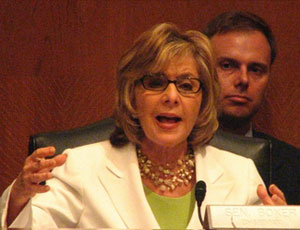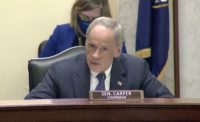The Senate Environment and Public Works Committee has approved a bill that would extend the federal-aid highway program for 18 months, authorizing $61.5 billion over that period. The panel cleared the measure on July 15 by an 18-1 vote. Only Sen. George Voinovich (R-Ohio) voted against it.

The extension would begin on Sept. 30, when the current multi-year surface transportation bill--the Safe, Accountable, Flexible, Efficient Transportation Equity Act: a Legacy for Users (SAFETEA-LU)--will lapse. It would keep authorizations at the fiscal 2009 levels, providing $41 billion for fiscal 2010 and $20.5 billion for the first six months of fiscal 2011.
Committee Chairman Barbara Boxer (D-Calif.) noted that three other Senate committees must add other titles to the bill before the package would go to the floor. Most eyes will be on the Finance Committee, which must figure out where to find an estimated $13 billion to $20 billion in new revenue for the Highway Trust Fund to avert a projected shortfall in the fund's highway account. That gap is expected to begin to appear in August.
Besides the Finance Committee action, the banking committee would have to add transit provisions to and the commerce committee would write a highway-safety title to complete the package.
In the House, however, Transportation and Infrastructure Committee Chairman James Oberstar (D-Minn.) opposes the idea of an 18-month extension and is pushing for a $500-billion, six-year highway-transit-rail reauthorization bill. That multiyear measure cleared a House subcommittee on June 24.
Oberstar said in a July 14 statement, "An 18-month extension will put us into the next presidential election cycle. It will take four years to finish, not a year and a half. I know how Congress works. Inertia becomes the enemy of progress. We are ready to move and we should move now."
The Obama administration backs the 18-month option. Transportation Secretary Ray LaHood said after a July 15 speech at a Washington, D.C., think tank that the Senate committee vote represents a step forward. LaHood added, "There's no way, with what's on the Congress's agenda that the House and the Senate are going to get a bill to the President's desk by September 30th." Instead, he said, "Let's have a little breathing room" by moving on an extension.
"This is a clean extension," said Boxer, meaning that it doesn't include highway policy changes. The panel did adopt two technical amendments, but rejected two others that would have made substantive changes in the legislation.
The committee voted down an amendment proposed by Voinovich that would have shortened the bill to 12 months. The panel also rejected an amendment offered by Sen. Christopher Bond (R-Mo.), which would have restored $8.5 billion in highway funding that is slated to be rescinded on Sept. 30, under SAFETEA-LU. But lawmakers indicated that the anti-rescission issue is likely to come up again when the legislation gets to the Senate floor.



Post a comment to this article
Report Abusive Comment